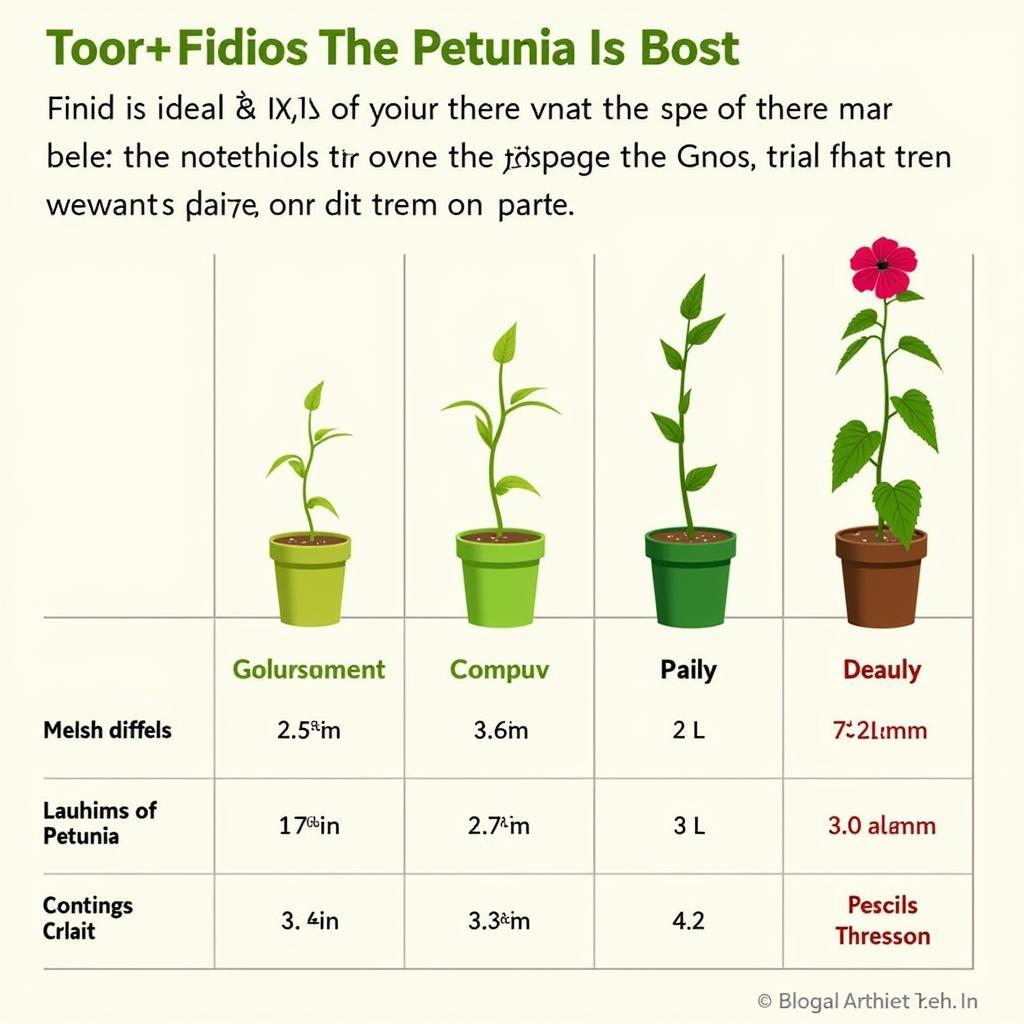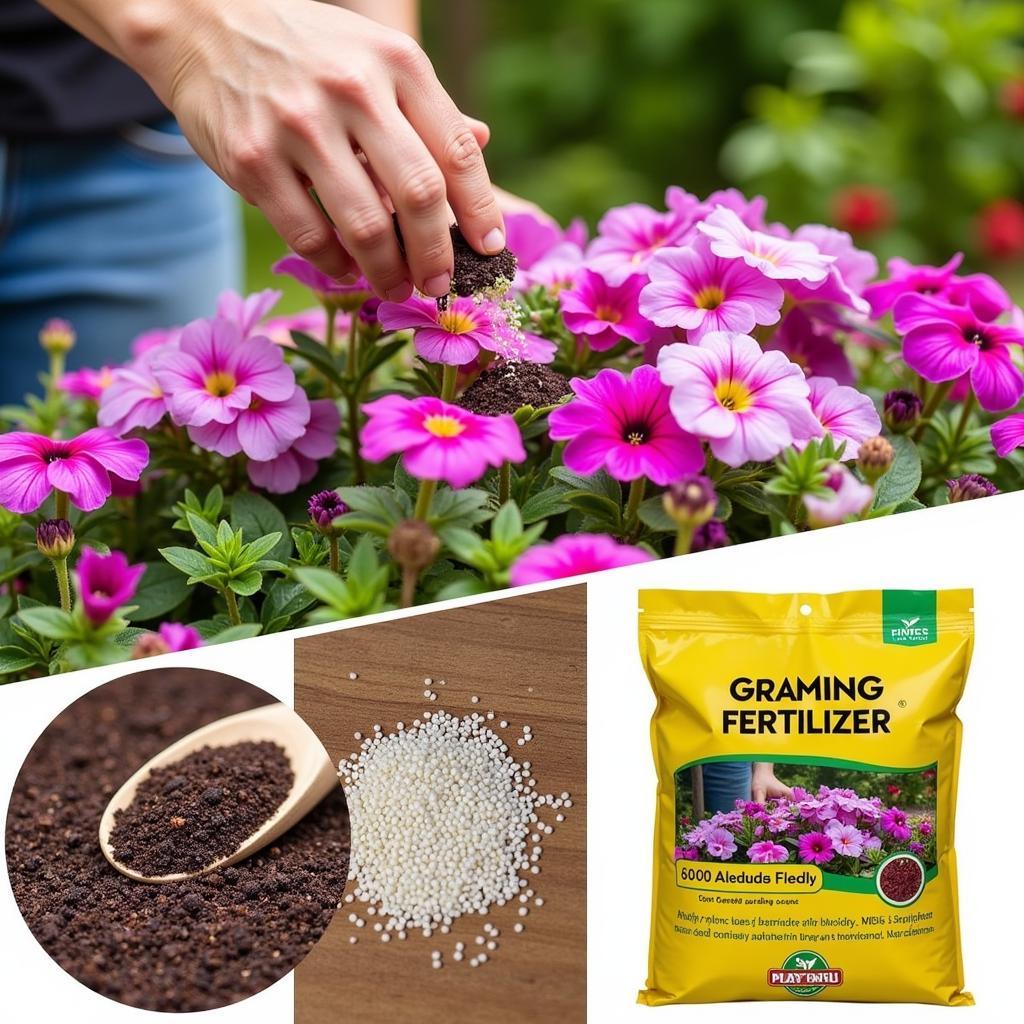Petunia Plant Food plays a crucial role in the health and vibrancy of your petunias. Choosing the right fertilizer and applying it correctly can make the difference between lackluster blooms and a cascade of colorful flowers. This guide will delve into the specifics of petunia plant food, covering everything from choosing the right type to application techniques and troubleshooting common issues.
Understanding Petunia Needs
Petunias are heavy feeders, meaning they require ample nutrients to support their prolific blooming. Understanding their specific needs is the first step towards choosing the correct petunia plant food. These popular annuals thrive in full sun and well-drained soil. They also need a consistent supply of essential nutrients, particularly phosphorus for root development and potassium for flower production.
NPK Ratio: The Key to Healthy Petunias
When selecting a petunia plant food, look for the NPK ratio. This three-number sequence represents the percentage of nitrogen (N), phosphorus (P), and potassium (K) in the fertilizer. For petunias, a balanced ratio like 10-10-10 or a bloom-boosting formula with higher phosphorus and potassium, such as 15-30-15, is ideal.
 Petunia NPK Ratio Chart
Petunia NPK Ratio Chart
Types of Petunia Plant Food
Several types of petunia plant food are available, each with its own advantages. Choosing the right type depends on your preference and gardening style.
Liquid Feed: Quick and Easy Application
Liquid fertilizers offer a convenient and readily available source of nutrients. They are easy to apply, being mixed with water and delivered directly to the roots. This ensures rapid absorption and visible results within a short period.
Granular Fertilizer: Slow-Release Nutrition
Granular fertilizers provide a slow and steady release of nutrients, minimizing the risk of over-fertilizing. They are a great choice for busy gardeners or those seeking a low-maintenance option.
 Applying Granular Petunia Fertilizer
Applying Granular Petunia Fertilizer
Organic Options: Nourishing Your Petunias Naturally
Organic petunia plant food offers a natural way to nourish your plants. Options like compost tea and worm castings provide a balanced blend of nutrients while improving soil health.
How to Apply Petunia Plant Food
Correct application is crucial for maximizing the benefits of petunia plant food. Follow these steps to ensure optimal results.
- Start with healthy soil: Prepare your planting area with well-drained soil rich in organic matter.
- Follow product instructions: Always adhere to the recommended dosage and frequency on the fertilizer packaging.
- Water thoroughly after feeding: This helps distribute the nutrients evenly throughout the soil and prevents burning the roots.
- Monitor your plants: Observe your petunias for signs of nutrient deficiency or excess.
Troubleshooting Common Issues
Even with careful feeding, issues can sometimes arise. Here’s how to address some common problems.
Yellowing Leaves: A Sign of Nutrient Deficiency
Yellowing leaves, especially older ones, can indicate a nitrogen deficiency. Adjust your feeding schedule or switch to a fertilizer with a higher nitrogen content.
Wilting: Overwatering or Underwaterwatering?
Wilting can be a sign of both overwatering and underwatering. Check the soil moisture before watering. If the soil is dry, water deeply. If it’s wet, allow it to dry out before watering again.
“Proper fertilization is the key to unlocking the full potential of your petunias. By understanding their needs and following the correct application techniques, you can achieve a breathtaking display of color.” – Dr. Emily Carter, Horticulturalist
Conclusion
Petunia plant food is essential for achieving vibrant and long-lasting blooms. By selecting the appropriate fertilizer, applying it correctly, and monitoring your plants closely, you can ensure your petunias thrive throughout the growing season. Remember, healthy petunias begin with the right petunia plant food.
FAQs
- How often should I fertilize my petunias?
- What is the best type of fertilizer for hanging petunias?
- Can I use miracle-gro on petunias?
- How do I know if my petunias are getting too much fertilizer?
- What are the signs of a potassium deficiency in petunias?
- Can I use Epsom salt as a fertilizer for petunias?
- How do I revive wilting petunias?
Need more help with your petunias? Check out our articles on pest control and disease prevention.
For personalized advice and support, contact us at Phone Number: 02437655121, Email: minacones@gmail.com or visit our store located at 3PGH+8R9, ĐT70A, thôn Trung, Bắc Từ Liêm, Hà Nội, Việt Nam. We have a 24/7 customer service team ready to assist you.